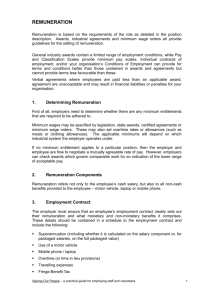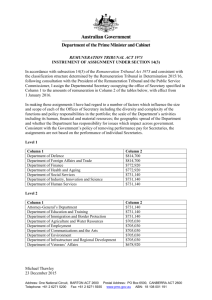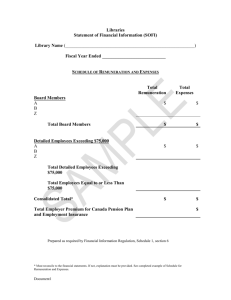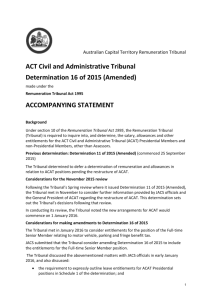Head of Service, Directors-General and Executives
advertisement
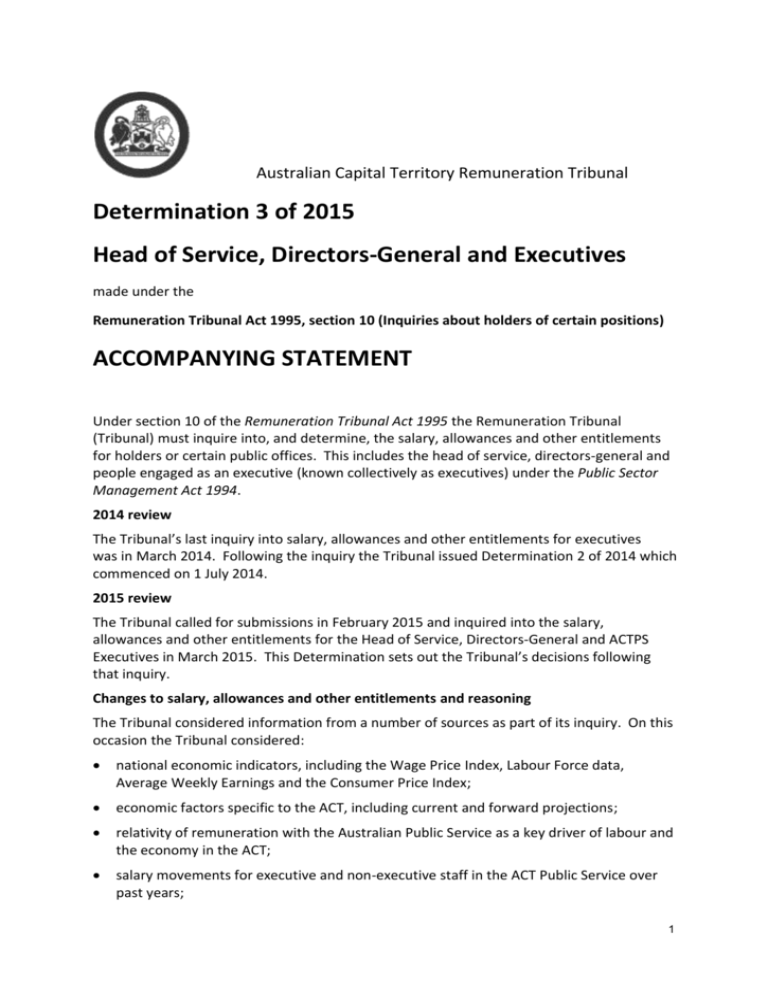
Australian Capital Territory Remuneration Tribunal Determination 3 of 2015 Head of Service, Directors-General and Executives made under the Remuneration Tribunal Act 1995, section 10 (Inquiries about holders of certain positions) ACCOMPANYING STATEMENT Under section 10 of the Remuneration Tribunal Act 1995 the Remuneration Tribunal (Tribunal) must inquire into, and determine, the salary, allowances and other entitlements for holders or certain public offices. This includes the head of service, directors-general and people engaged as an executive (known collectively as executives) under the Public Sector Management Act 1994. 2014 review The Tribunal’s last inquiry into salary, allowances and other entitlements for executives was in March 2014. Following the inquiry the Tribunal issued Determination 2 of 2014 which commenced on 1 July 2014. 2015 review The Tribunal called for submissions in February 2015 and inquired into the salary, allowances and other entitlements for the Head of Service, Directors-General and ACTPS Executives in March 2015. This Determination sets out the Tribunal’s decisions following that inquiry. Changes to salary, allowances and other entitlements and reasoning The Tribunal considered information from a number of sources as part of its inquiry. On this occasion the Tribunal considered: national economic indicators, including the Wage Price Index, Labour Force data, Average Weekly Earnings and the Consumer Price Index; economic factors specific to the ACT, including current and forward projections; relativity of remuneration with the Australian Public Service as a key driver of labour and the economy in the ACT; salary movements for executive and non-executive staff in the ACT Public Service over past years; 1 pay increases outlined in the ACT Public Service Administrative and Related Classifications Enterprise Agreement 2013-2017; salary comparisons with other jurisdictions; and the Government submission provided by the Chief Minister. Having balanced these considerations the Tribunal decided to increase the salary for the Head of Service, Directors-General and ACTPS Executives by 2.5%. ACT Remuneration Tribunal April 2015 2 Australian Capital Territory Remuneration Tribunal Determination 3 of 2015 Head of Service, Directors-General and Executives made under the Remuneration Tribunal Act 1995, section 10 (Inquiries about holders of certain positions) 1 Commencement 1.1 This instrument commences on 1 July 2015. 2 Remuneration 2.1 A person engaged at an executive level remuneration point listed in column 1 of Table 2.1 is entitled to the remuneration mentioned in column 2 of Table 2.1. TABLE 2.1 2.2 Column 1 Column 2 Executive level remuneration point Salary Level 3.12 Level 3.11 Level 3.10 Level 3.9 Level 3.8 $340,038 Level 3.7 Level 2.6 Level 2.5 Level 2.4 Level 1.3 Level 1.2 Level 1.1 $254,804 $315,276 $298,821 $284,121 $269,425 $245,620 $210,790 $196,091 $172,285 $157,588 $142,889 If a person engaged at a level listed in column 1 of Table 2.1 is also engaged in or appointed to another office, which is not a second job under the Public Sector 3 Management Act 1994, the person must only receive remuneration for the office that has the highest remuneration. 3 Salary packaging 3.1 An executive may elect to take the remuneration mentioned in column 2 of Table 2.1 as: a) salary; or b) a combination of salary and other benefits (a salary package). 3.2 Salary packaging must be consistent with: a) taxation laws and guidelines issued by the Australian Taxation Office; and b) any salary packaging policy and/or procedures issued for the ACT Public Service, with up to 100% of the remuneration able to be taken as benefits and related costs such as fringe benefits tax. 3.3 If an executive is working for a Public Benevolent Institution, the benefit items that normally incur fringe benefits tax must not incur more than $17,000 grossed up taxable value per fringe benefits tax year, without prior approval from: a) for the head of service and directors-general—the Commissioner for Public Administration; and b) for executives—the relevant director-general. 3.4 Salary packaging must be administered without additional cost to the employer and any fringe benefits tax associated with the provision of a benefit must be included in the salary package. 3.5 Salary for superannuation purposes is not affected by salary packaging. 4 Employer provided benefits 4.1 An executive is entitled to either the employer provided benefits mentioned in column 1 of Table 4.1 or the relevant cash payment in lieu of the benefit mentioned in column 2 of Table 4.1. TABLE 4.1 Column 1 Column 2 employer provided benefit cash payment in lieu of benefit employer’s superannuation contribution no option for cash payment in lieu executive vehicle parking space under the Public Sector Management Standards 2006 fringe benefits tax $7,000 Note: employer provided benefits or cash payment in lieu of the benefit do not change the remuneration component of the total remuneration package. Note: travel entitlements are provided under the Public Sector Management Standards 2006. Employer’s superannuation contribution 4.2 An executive is only eligible for the employer’s superannuation contribution if their superannuation entitlements are not provided elsewhere. 4 4.3 The employer’s superannuation contribution is subject to the Superannuation Act 1976 (Cth), Superannuation Act 1990 (Cth) and Superannuation Act 2005 (Cth). Note: section 642 of the Public Sector Management Standards 2006 sets out superannuation for some executives appointed from 1 July 2006. 4.4 An executive who is a member of the CSS or PSS— a) may elect that the employer continues to meet its requirements under the Superannuation Act 1976 (Cth) and the Superannuation Act 1990 (Cth) as they apply to people who are contributory members of the CSS and PSS; and b) for the purposes of calculating this component of the total remuneration package, the value of the employer’s superannuation contribution will notionally be deemed to be 16% of their remuneration. 4.5 If an executive who is not a member of the CSS or PSS was appointed to or engaged by the Territory before 30 June 2006, and maintained continuous employment with the Territory— a) the value of the employer’s superannuation contribution is 16% of the remuneration component; and b) the employer will contribute an amount equal to this on behalf of the executive to an agreed superannuation fund nominated by the executive. 4.6 The value of the employer’s superannuation contribution must not be paid in cash to an executive. Fringe benefit tax 4.7 The fringe benefits tax payable to an executive is the amount remaining after the employer’s liability for fringe benefits tax is calculated, as required under the Fringe Benefits Tax Assessment Act 1986. 4.8 The executive vehicle and employer’s superannuation contribution set out in the Public Sector Management Standards 2006 are considered for calculating fringe benefits tax. 4.9 If the liability for fringe benefits tax exceeds $7,000 an executive will not be required to pay the excess to the employer. 4.10 Fringe benefits tax is reduced proportionally if the executive is engaged for less than a financial year. 5 Relocation allowance 5.1 In this clause: ACT includes the surrounding district, including Queanbeyan. relocation means from a residence outside the ACT to a residence in the ACT. 5.2 Relocation allowance is provided to assist an individual with relocation. 5.3 Relocation allowance will not cover the total cost of relocation in all circumstances. 5.4 The maximum relocation allowance is $51,533. 5.5 If a person relocates because of engagement as an executive, the person is entitled to be reimbursed up to the maximum relocation allowance, for receipted, reasonable costs of the following: 5 a) b) c) d) e) packing personal effects and furniture belonging to the person and their family; necessary storage of personal effects and furniture; removal costs and associated insurance of personal effects and furniture; unpacking of personal effects and furniture; costs of travel, accommodation and meals between the former location and the ACT; f) temporary accommodation costs at the former location and in the ACT up to a maximum aggregate period of six months, or, in exceptional circumstances, nine months with the approval of the ACT Remuneration Tribunal; g) costs of disconnection and reconnection of utilities; h) cost of stamp duty and legal and professional services associated with the sale of the residence at the former location and/or the purchase of a residence or lease on a block of land in the ACT; i) subject to the specific approval of the ACT Remuneration Tribunal, any other reasonable expenses necessarily incurred in relocating to the ACT. 5.6 The maximum relocation allowance may be exceeded if the ACT Remuneration Tribunal agrees— a) there are unusual or exceptional circumstances; and b) the unusual or exceptional circumstances were unforeseen or unable to be dealt with without exceeding the maximum relocation allowance. 5.7 If an executive thinks that unusual and exceptional circumstances exist, they may ask the ACT Remuneration Tribunal to consider the matter and determine whether the maximum relocation allowance can be exceeded. A request must be in writing and must include— a) details of the unusual or exceptional circumstances; and b) details of the relocation; and c) expenses incurred by the executive; and d) the expected total relocation expenses of the executive; and e) the level of assistance the executive considers should be provided; and f) any other relevant information. 5.8 Relocation allowance does not apply to any expenses incurred at the conclusion of employment. 6 Definitions 6.1 In this Determination: agreed superannuation fund means a fund complying with the requirements of: the Income Tax Assessment Act 1936 (Cth); and the Superannuation Industry (Supervision) Act 1993 (Cth). CSS means the Commonwealth Superannuation Scheme. employer means the Australian Capital Territory and includes any person authorised to act on behalf of the Australian Capital Territory. executive means the Head of Service, a Director-General or an ACTPS Executive. 6 fringe benefits tax means the tax assessed under the Fringe Benefits Tax Assessment Act 1986. PSS means the Public Sector Superannuation Scheme. total remuneration package includes remuneration set out in Table 2.1, all employer provided benefits, and all allowances. The value of an allowance or entitlement set out in this Determination is fixed and cannot be transferred to another other component of the total remuneration package. 7 Revocation of previous Determination 7.1 Determination 2 of 2014 is revoked. Anne Cahill Lambert AM Chair ................................................................. Dr Colin Adrian Member ................................................................. James Smythe PSM Member ................................................................. April 2015 7

